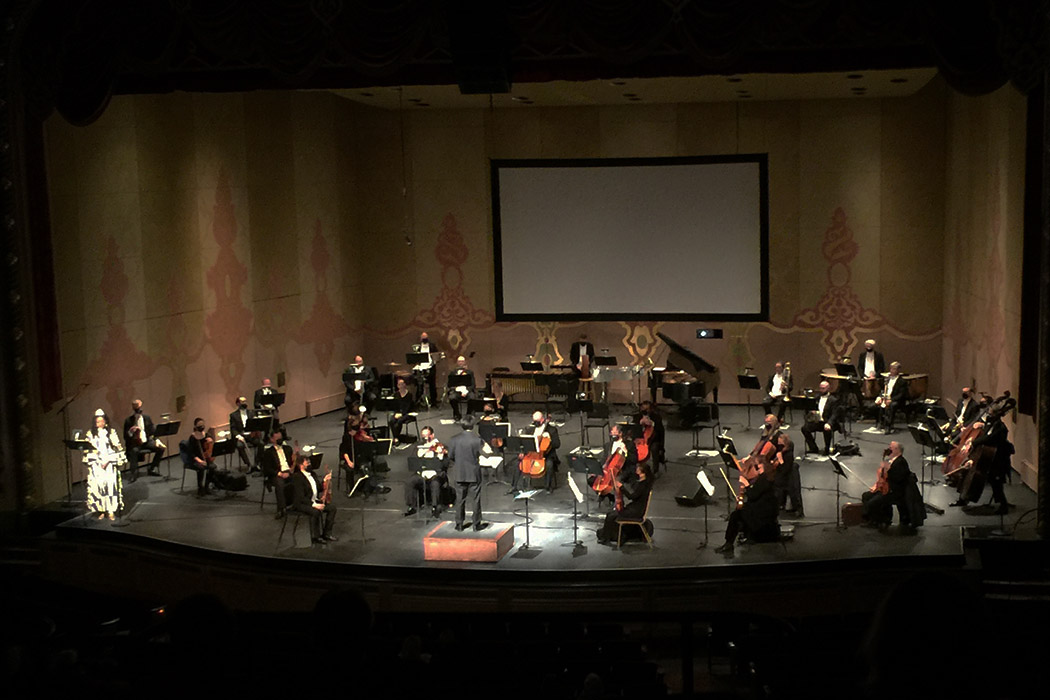As the Covid-19 virus ravaged lives and livelihoods over the last year, those artists who had been on the verge of big moments and big careers seemed in serious peril. Thankfully, the young composer, Carlos Simon, seems to have weathered the career storm and potential loss of inertia that the pandemic has wrought. In its gradual, limited return to live audience performances, the Knoxville Symphony Orchestra introduced Simon’s Portrait of a Queen on Thursday evening at the Tennessee Theatre to an audience that was probably making Simon’s musical acquaintance for the first time. And, this was a growing, but limited-capacity audience that was not only grateful and appreciative for the return of live performances, but intrigued by the experience of hearing a talented composer at the beginning of what should be a major career.
KSO music director Aram Demirjian constructed the evening’s concert of four works around what “should have been”—past and present. Following the opening work, Joseph Haydn’s cleverly satisfying Symphony No. 85 (“The Queen”), Demirjian and the orchestra launched into a symphony by a Haydn contemporary, Joseph Boulogne, otherwise known by the title of Chevalier de Saint-Georges. As one of the many ironies of racism, Saint-Georges, the son of a wealthy French planter and an African slave, was educated in France and there became a renowned violinist, composer, and conductor, as well as a champion fencer. It was in his capacity as orchestra leader of the Concert Olympique that Saint-Georges commissioned and premiered the six “Paris” symphonies from Haydn that included the No. 85. The “should have been” here is that, despite his popular abilities and the favoritism of Queen Marie Antoinette who was an admirer of both composers, Saint-Georges’ career was stymied by those who refused to accept his mixed race status.
Demirjian and the orchestra took full advantage of the charming nature of both works, particularly in the juxtaposed details of strings and woodwinds. Notably in the Haydn, the exposed violin and bassoon duets (William Shaub, violin; Zack Millwood, bassoon) were nicely balanced moments of string sunshine and luscious, dark wood.
Demirjian followed with an example of a “should have been” closer to home—the American composer Florence Price. In a letter to the conductor Serge Koussevitzky in 1943, Price wrote “My dear Dr. Koussevitzky, To begin with I have two handicaps—those of sex and race. I am a woman; and I have some Negro blood in my veins.” Although she was the first female black composer to have a work performed by a major symphony orchestra, we tell ourselves that things would have been different today. But would they?
Price’s Andante moderato for Strings, arranged from a movement of her String Quartet in G major, is lush, luscious, and lyrical, in this case, a welcome opportunity for the KSO strings to reclaim their ensemble strengths.

The real eye-opener, and ear-opener, of the evening was Simon’s impressive Portrait of a Queen. Written as his doctoral composition at the University of Michigan in 2017—scored for strings, piano, percussion, some audio playback, and a female voice as a spoken narrator (text written by Courtney D. Ware)—the work is bold and charged with the energy and textures of struggle and hope. The narration was read with restrained power and obvious loving gravity in this performance by Knoxville’s Reneé Kesler.
Simon’s program notes describe the work: “This piece traces the evolution of black people in America through the lens of one figurative black woman who represents strength, courage and selflessness.” The composer punctuates the text with a constantly changing meter that seems to push and pull the narration along. After a prologue come three sections, each with its own time period differing in character, textures, and varying degrees of syncopated idioms that are either bold or quietly unsettling.
If Thursday’s audience was any indication, Simon is yet another American composer to keep our eye on. As if we needed any more evidence, he was one of the recipients of the 2021 Sphinx Medal of Excellence that recognizes extraordinary classical Black and Latinx musicians. He now finds himself in the company of a number of musicians familiar to Knoxville audiences, including Anthony McGill (principal clarinet of the New York Philharmonic), composer Jessie Montgomery, and mezzo-soprano J’nai Bridges.





